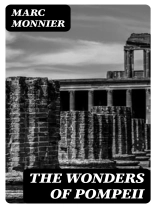In ‘The Wonders of Pompeii, ‘ Marc Monnier masterfully evokes the splendor and tragedy of ancient Pompeii, employing a vivid narrative style that intertwines rich descriptions and historical insights. Through meticulous research, Monnier immerses readers in the day-to-day lives of the Pompeians, exploring their customs, art, and architecture before the cataclysmic eruption of Mount Vesuvius. The book not only captures the essence of a society frozen in time but also serves as a poignant reminder of the fragility of life, pending the unpredictable forces of nature. Monnier, a prominent Swiss writer and historian known for his passion for antiquity, brings to life the ruins of Pompeii through his extensive travels and profound understanding of classical history. His fascination with the interplay between civilization and catastrophe is evident in his other works, yet it is in ‘The Wonders of Pompeii’ that he achieves a striking balance between engaging storytelling and scholarly rigor, showcasing his desire to share the extraordinary narrative of this Roman town with broader audiences. This book is highly recommended for both history enthusiasts and general readers alike. Monnier’s engaging style and rich historical context not only entertain but also educate, offering invaluable insights into a remarkable civilization. ‘The Wonders of Pompeii’ will captivate anyone interested in the intersections of history, art, and the human condition.
关于作者
Marc Monnier (April 7, 1829 – March 26, 1885) was a Swiss writer, poet, and critic, known for his vivid engagement with Italian culture and history. Born in Florence to Swiss parents, Monnier was immersed in the spheres of art and literature from an early age. His education was comprehensive, encompassing law, letters, and philosophy, which reflected in his literary versatility. Monnier was arguably most recognized for his work ‘The Wonders of Pompeii’ (originally ‘Les Merveilles de Pompei’), which showcases his fascination with antiquity and adeptness in historical exposition. In this approachable yet scholarly account, Monnier painted a detailed picture of the ancient city, enthralling readers with its architectural, cultural, and social riches revealed by archaeological excavations. His elegant prose and insightful observations testify to his ability to animate the past for his contemporaries. Monnier’s literary style typically weaved narrative charm with academic rigor, making his works accessible to a broad readership while retaining intellectual substance. His contributions extend beyond historical commentary to include lectures in literature at the University of Geneva, demonstrating his commitment to academia and education. By positioning himself both as a participant in and chronicler of cultural milieus, Monnier’s writings offered unique perspectives enriched by cross-disciplinary insights. His legacy, though less prominent today, remains a testament to the enlightening power of literary engagement with history and art.












